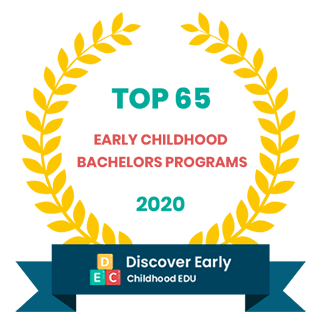Early Childhood Education (MS) Online
About
Explore the landscape of early childhood education from previously unseen angles. Understand more about children and the sociocultural communities they inhabit. Integrate these insights with examinations of classrooms and schools to better serve young children and their families.
UNT’s accelerated online Master of Science in Early Childhood Education program is designed for those who want to learn how to better respond to the changing needs of early childhood students. Our master’s students critically examine the nature of early childhood classrooms, centers, and schools in order to reconceptualize what it means to teach and care for young children. This knowledge translates into skills that can be applied across research, policy, and practice settings, preparing our graduates to be advocates for children — whether it be better teachers, more reflective administrators, or more critical researchers and policymakers.
Top Careers
-
Preschool Teachers
-
Kindergarten Teachers
Top Posted Job Titles
-
Lead Teacher
-
Child Care Teachers
-
Teacher Assistants
Apply
Program deadline dates
For fall enrollment: July 1
For spring enrollment: Nov 15
For summer enrollment: April 1
Application Process
You must be admitted to the Graduate Admissions Office before enrolling in the accelerated online program. Conditional acceptance to graduate school can be granted if you meet program requirements.
- Submit your GradCAS application and choose the "Master of Science degree in Early Childhood Education" in the degree plan list. Confirm that you are applying for the accelerated online program when prompted.
- Request an official transcript of your records from each college or university that you have attended and have them sent via the GradCAS application portal.
- Pay the $75 application fee at the time you apply.
Additional supporting application materials include:
- Three satisfactory letters of reference, on letterhead, from professionals who address the applicant's ability to successfully pursue graduate study.
- A 3-4 page double-spaced essay explaining the purpose for undertaking graduate study at UNT, including professional plans or career goals and a discussion of professional interests related to early childhood education.
- A resume detailing your professional experience.
All program materials should be submitted through the GradCAS portal.
Admission decisions will be made based on a holistic review of applicant qualifications. Admission status can be viewed in the GradCAS application portal.
Additional Information for International Applicants
We're here to help you every step of the way. Call 940-565-3290 or e-mail MS-EarlyChildhoodEd@unt.edu. with questions.
Visit the Registrar's website for more information on course registration dates and payment deadlines.
Courses
The accelerated delivery provides five course start times per year. Courses will be offered in 8-weeks sessions during the long semester or shorter during the summer session. Students who maintain the accelerated 30-hour course sequence can complete course work in 12 months.
Required courses, 30 hours
Fall 8W1 (August to October)
- EDEC 5513 - (3 hrs) Advanced Studies in Early Childhood Education
- EDEC 5613 - (3 hrs) Curriculum Theory in Early Childhood Education
Fall 8W2 (October to December)
- EDEC 5013 - (3 hrs) Research Strategies in Early Childhood Education
- EDEC 5643 - (3 hrs) Leadership and Supervision of Programs
Spring 8W1 (January to March)
- EPSY 5133 - (3 hrs) Infant and Child Development
- EDEC 5470 - (3 hrs) Constructions of Guidance in Early Childhood Classrooms
Spring 8W2 (March to May)
- EDEC 5633 - (3 hrs) Assessment in Early Childhood Education
- EDCI 5130 - (3 hrs) Schooling in a Multicultural Society
Summer 8W1 (May to July)
- EDEC 5653 - (3 hrs) Making the Literacy Connection: Language to Reading
- EPSY 5210 - (3 hrs) Educational Statistics
OR
- EDEC 5800 - (3 hrs) Special Topics in Early Childhood Studies
Costs
Estimate tuition and fees by using the Tuition Calculators. For more information about tuition plan options, fees, and tuition, see Student Financial Services.
Financial Aid
UNT offers a variety of options to help finance your education. Visit financialaid.unt.edu to find out more about the application and award process.
UNT has been named one of America's 100 Best College Buys© for 25 consecutive years and offers the quality of a private university at an affordable cost.
Applying for financial aid
- Apply for financial aid online at fafsa.gov. The application is required for all types of financial aid, including Pell and other federal grants, state grants and loans. The FAFSA and Renewal FAFSA are available annually.
- You must enroll in 6 hours (over one or two online sessions) in order to be eligible for financial aid.
- Financial aid awards will be disbursed 10 days prior to the first day of class. Awards will not disburse if you are enrolled in only 3 credit hours.
- Contact Student Financial Aid and Scholarships at 940-565-2302 or by visiting online at financialaid.unt.edu
